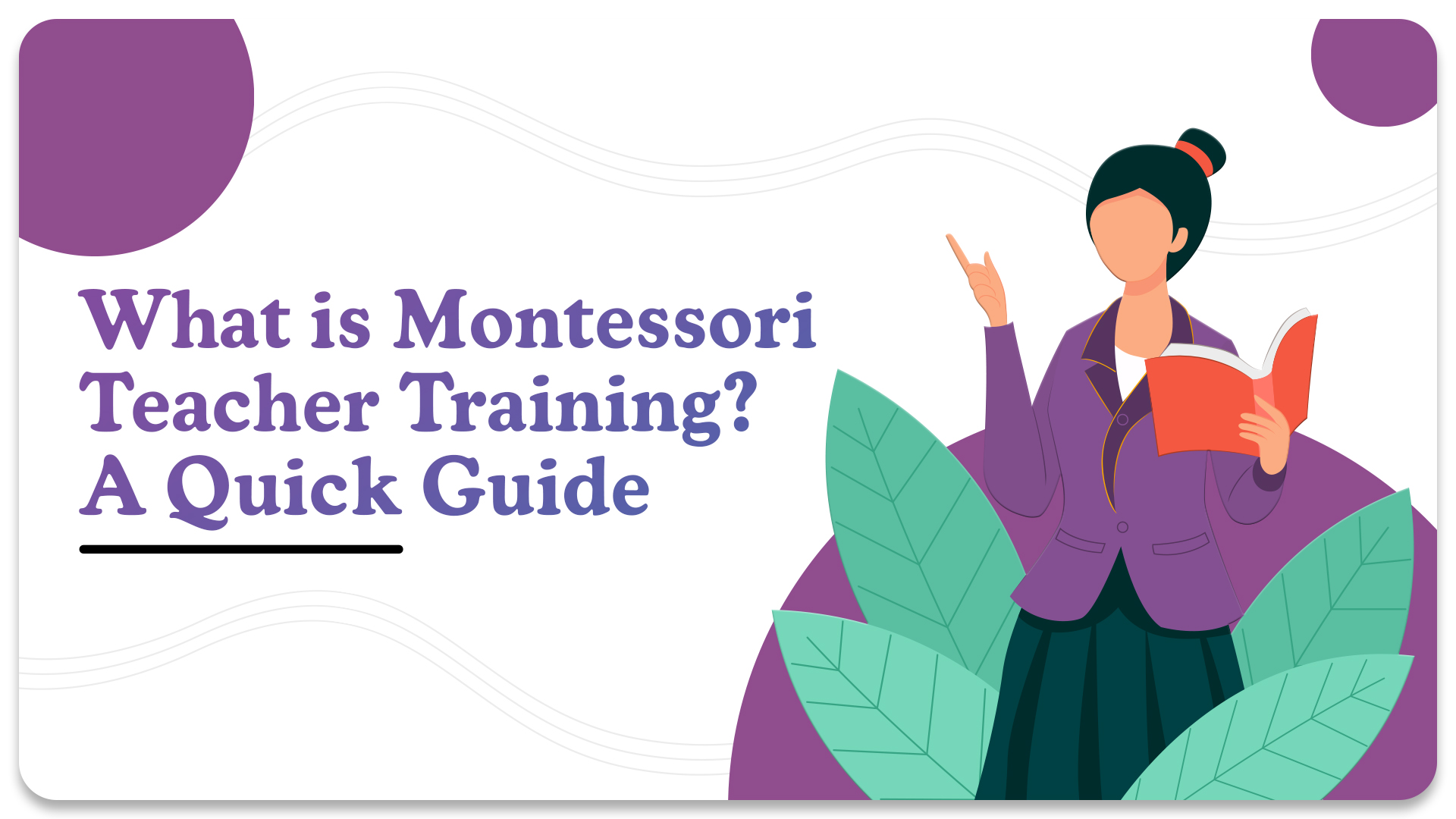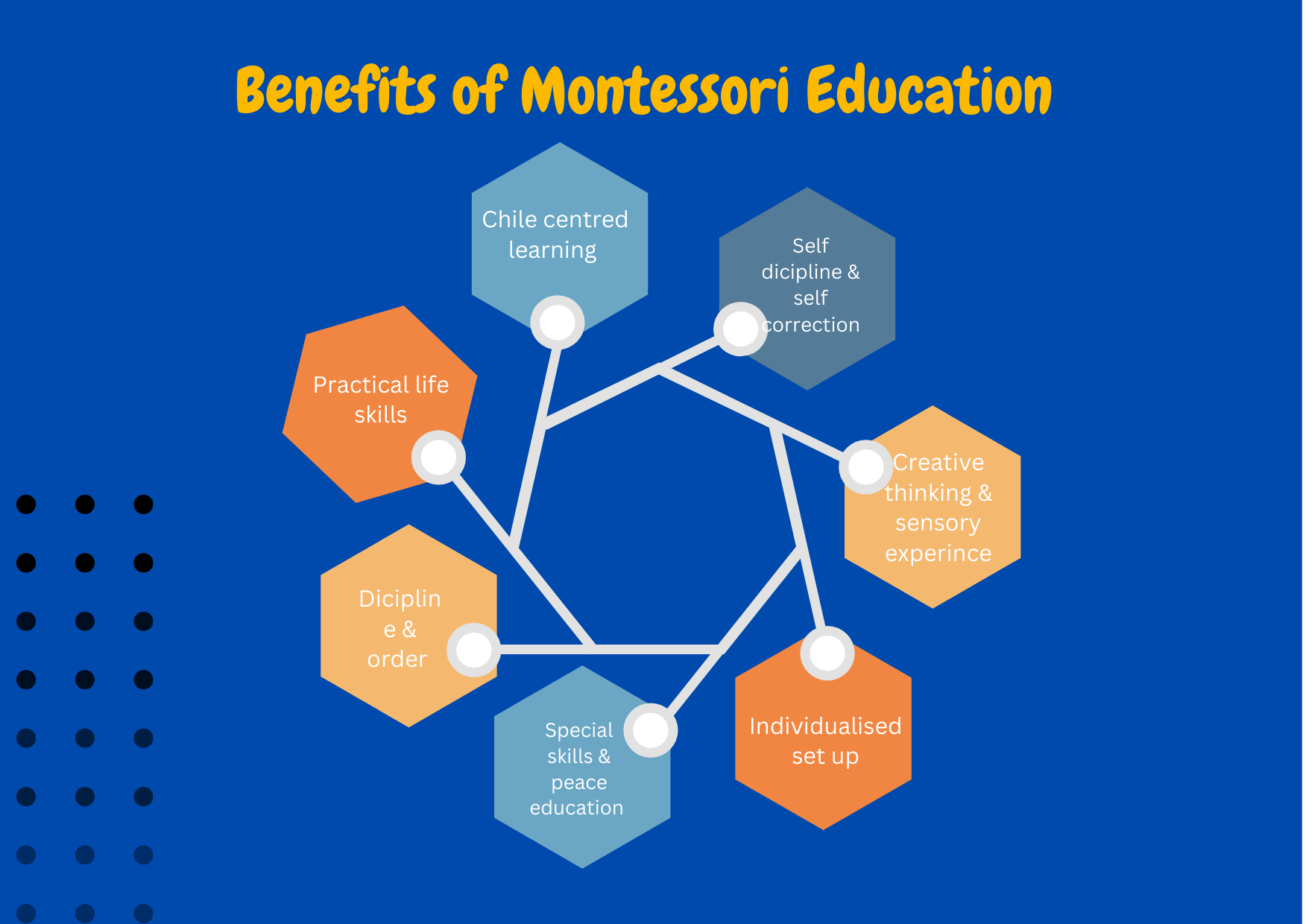What is Montessori Teacher Training? Here's What You Should Know First




.png)
Montessori Teacher Training is a program designed to prepare individuals to become Montessori teachers. It involves learning about the Montessori philosophy, child development, and the use of Montessori materials and methods.
Rather than a traditional teacher, a Montessori-trained teacher acts as a guide, sparking curiosity in children. Before enrolling in a Montessori course, aspiring teachers often have the following questions:
And many other questions every upcoming Montessori teacher would like expert answers to!
Worry not; our experts are readily available to tell you everything an upcoming Montessori teacher should understand before enrolling in the course.
Let’s start from the basics!
Montessori is a way of teaching where kids learn by doing things themselves. They choose what they want to learn and play with other kids. The teacher helps them by providing fun activities that match their age.
According to Maria Montessori, it is a special way of teaching where kids learn by doing things on their own. They watch, think, and learn at their own pace.
The teacher helps them by making sure they have the right things to learn with and by gently guiding them. This way of teaching is good for kids of all ages.
By doing so, how will it help children? This question is often asked by parents who are considering pursuing the course to teach their kids.
Homeschooling has become a prevailing trend in Kerala, particularly after COVID-19, and many parents want to ensure their children receive the best foundation. Now, let's return to our topic. It's time to explore how a Montessori-trained child differs from traditionally trained kids.
Are you ready to explore how Montessori education will help kids?
Montessori education provides a holistic approach to learning and gives children an opportunity to have hands-on experiences. This helps them focus, think critically, and become independent learners.

When we read the words of Maria Montessori, we understand that the greatest gift we can give our children is the ability to think for themselves. Montessori education encourages children to become critical thinkers, independent learners, and respectful individuals. Here are a few principles of Montessori education.
Doctor Maria Montessori’s research determined that the first six years of life are the most crucial in a child’s development. She termed this stage the period of the ‘absorbent mind’ to describe the child’s sponge-like capacity to absorb information from their environment.
Montessori helps kids learn a lot during their important early years. The special toys and activities let kids explore and learn on their own. This makes them love learning and feel good about themselves.
If you’ve seen a Montessori classroom, you’ll notice it consists of tools like sensory bins, counting beads, and building blocks. These allow children to learn by touching, feeling, and experimenting.
For instance, a child in a Montessori setting might learn maths by stacking blocks, making it easier to grasp concepts. This hands-on experience makes abstract ideas clearer and learning enjoyable.
%20(1).png)
A glimpse of a Montessori classroom
.png)
Montessori encourages uninterrupted work periods where children choose activities they’re drawn to. This focus-building practice improves their ability to concentrate over time and helps them handle more complex tasks as they grow.
.png)
Through engaging activities like matching games, pattern blocks, and sorting exercises, children are encouraged to think critically and solve problems.
Imagine a child working on fitting differently shaped blocks into a board; they’re developing spatial awareness and problem-solving skills. By doing this regularly, they become more adaptable and resourceful in the process.
.png)
Montessori environments are designed to spark curiosity by offering a variety of topics, from science and nature to geography. When children learn interestingly, they don't show laziness. This makes both learning and teaching easier.
%20(1).png)
In Montessori, children choose their own activities, which nurtures self-confidence and decision-making. By making choices, they learn responsibility and independence. In other words, they understand the joy of completing something all by themselves.
%20(1).png)
Montessori classrooms are collaborative, with activities that encourage children to share, cooperate, and show empathy. Kids might work together on a project, take turns with materials, or help each other complete tasks.
This environment teaches respect for others and helps them understand the value of teamwork. Later on, they go on to develop strong social skills.
Research shows the unlimited benefits of Montessori pedagogy. Here are a few of them. Definitely, it will make you say 'wow!' when you learn about the benefits. As people discover the advantages it offers, many are coming forward to learn.
Why? They want to teach their kids or become Montessori teachers. Whatever your goal is, if you want to learn Montessori, here are the eligibility requirements you must meet.
Anyone with a higher secondary qualification can join the Montessori course. It is the minimum eligibility. If you have a burning desire to be a Montessori teacher, you can join the course at the earliest.
What are the topics you need to study in a Montessori course? Let's take a look.
Most Montessori teacher training students worry about their language skills because they are returning to studies after a break (though it's not the case for everyone).
So, At Interval, we offer a Montessori course. Our syllabus is structured to alleviate the fears and problems of our students and prepare them to represent globally.
Just have a look at what you are learning in the Interval Montessori course.
A solid understanding of different teaching styles helps them adapt their approach to suit different learners.
Understand how to effectively manage a classroom and handle administrative duties that contribute to a well-run educational environment.
Gain insights into childhood nutrition, hygiene, and common health issues, along with basic first aid knowledge.
Explore the psychological principles that underlie child development, including key milestones, natural laws of development, and how to support children during their sensitive periods of growth.
Learn techniques to effectively teach English in the classroom.
How to help children sharpen their sensory perception and techniques to enhance their ability to learn through exploration and observation.
Different ways to support children’s language growth and learn how to enable them to communicate effectively and develop literacy skills.
Creative methods to make maths and logic enjoyable, helping children build strong foundations in problem-solving and critical thinking.
Download the Latest Syllabus Here
At Interval, we offer online Montessori training. The name of the course is ECPC (Early Childhood Preparatory Course). We make it online because of the following reasons:
We want to accommodate those who are trying to learn.
If it is online, it would be helpful for them to learn at their own pace. The convenience of homemakers.It means they don't need to sacrifice anything to resume their studies. Our aim is to provide a source of income from the comfort of their home.
After our training, we offer internships online, so our students will learn how to be a tutor online. The certifications we offer are internationally recognized and increase their exposure to a global level.
Guess? Yes, it is Interval! Why? The reasons are detailed above.
If you want to know more, Please click the videos below. They have learned from Interval and are now Montessori teachers
If you listen to their stories, you will understand how proud they feel about themselves. It is your turn to change your destiny. If you won't take action today, when will it be possible?
Enrol today and be a Montessori teacher and live your dreams!
It's completely a Montessori Teachers training course. The course is typically divided into two phases: 6-month theory: Focuses on Montessori methods of teaching in early childhood education. 6-month internship: It will be an Online internship. In the 6 month internship period students will take 350 hours of classes for Little Genie Students. In the internship periods, they will get a stipend amount. It will be an experience in real-world early childhood settings, such as preschools.
Key subjects often include: Educational Psychology- Focus on the psychology of a child. Montessori Philosophy- Philosophy About Montessori Methods PreSchool Education- Focus on Different Teaching policies of Preschool education and Different teaching methods PreSchool Management- It Focuses on physical, Financial, human, and community resources. Communicative English- It's a complimentary course to develop communication skills. Practical- It Focuses on Montessori materials and how it is present in Children.
Upon completing the course, you will typically receive: Certificate or Diploma in Early Childhood Education by Interval learning CEED- Internationally valid Certificate for Diploma in Montessori Teachers Training Course. FICS- UK Certification
We will provide placement assistance for students also After completing Internship in Little Genie They will be placed as aTeacher In Little Genie. Many institutions offer job placement assistance as part of the program. They may connect you with daycare centers, preschools, or other educational settings. Students Can do teaching Practices From Offlines Schools, Here the mentors will provide the guidance.
Classes may be offered during the daytime or evening to accommodate students’ schedules. Class hours: Usually around 6 hours a week for theory classes. 1 hour per day.
We taking classes through INTERVAL LIVE LEARNING APP Submit the Works and assignments in GOOGLE CLASSROOM
Yes, there will be 4 textbooks provided by CEED. Educational Psychology Montessori philosophy PreSchool Education Preschool Management No Other online resources were provided.
The fees for a 12-month Early Childhood Preparatory course (6 months theory + 6 months internship) can range between: 39440/- is the Original Fee, It can be paid in term-wise. First pay an amount as an Initial payment, After 2 Months pay the 1st term fee, After 2 months pay the 2nd term fee, After 2 months Pay the 3rd payment. Within 6 months the student will complete the whole fee. One-time payment: 38400/- Additional costs: If a student is willing to pay the amount for dispatching the textbooks GCC should pay the amount. It will vary according to the place.
Typically, the student should complete the Higher Secondary (or equivalent) is required to enroll. Need to Submit the Certificates to CEED. UG and PG-qualified students also can attend the Early Childhood Preparatory Course.